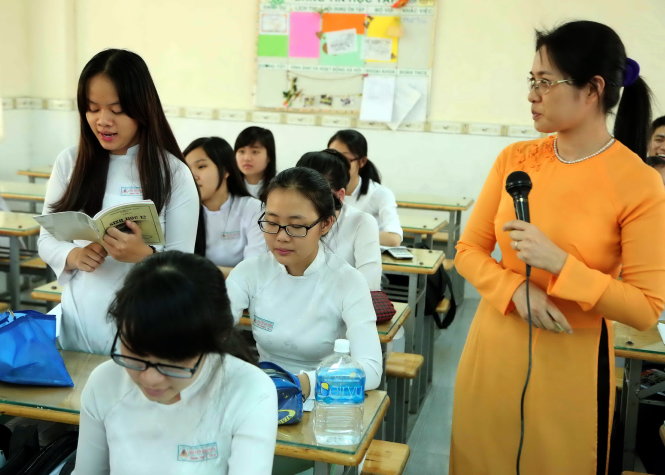Editor's note: In 2035, those working in Vietnam’s education sector would hopefully stop running after learning and teaching achievements at any cost, Song Huyen wrote in her entry to the “Ky Vong Viet Nam 20 Nam Toi” (“My Expectations for Vietnam in 20 Years”) writing competition.
The “achievement malady” is what tends to crop up in people’s minds when it comes to Vietnam’s education.
As a teacher of 20 year, I ache every time people mention it. Whether we want it or not, we teachers have contributed to the chronic malady, which has yet to be cured.
I wish teachers and students would be allowed to teach and learn at their real capacity. There would no longer be well-rehearsed, “staged” classes so that assessors will rank and hail them.
Teachers would no longer be requested to submit their innovative pedagogical ideas or helpful solutions each academic year. Many teachers search for and copy others’ research projects on the Internet and concoct them into their own submissions, which will be assessed and help decide their performance. Teachers would stop providing their students with questions or answers or preparing them intensively prior to examinations or tests.
Teaching staff would then have their full right in assessing and ranking their students without being affected by any pressure.
No students would “sit in the wrong classes” then, which has resulted in situations in which seventh graders fail to write their own names, or do the simplest calculations. Students would be ranked based on their genuine abilities, and high achievers would be only those who perform outstandingly.
Students’ parents would no longer insist that teachers let their children retake their classes, and the teachers cannot agree though they know it’s the right thing to do.
Parents would no longer bother to bribe teachers into giving their children good marks or pay for their entry to good schools.
Teachers would also not be put under pressure whenever their students drop out of school and they have to implore them to return in vain. In such cases, teachers now have to use ploys to legalize the dropout so that their performance is not affected.
The teaching staff would not be gripped by the fear that their students do not perform well enough, leaving them to manipulate to raise these students’ marks. Teachers would no longer come to their students’ “rescue” whenever they sit in exams. Token exams for gorgeous data to beautify superiors’ reports would also be a thing of the past. Without all these, students would definitely learn and be assessed on their own abilities.
High performing students would go on with their studies, while poorer achievers would switch to vocational training schools.
It would be harder to gain entrance to universities, but fresh graduates would find jobs right after graduation. Rife unemployment or university graduates resigning themselves to being factory workers would be long gone. Education quality, instead of quantity, would be the thing that counts.
Chasing after false accomplishments has brought about insidious consequences, including deceit and cheating on superiors, as well as complacency and illusions about oneself and one’s abilities.
Curing the malady is tough, as it is deep-rooted in the minds of many people outside the education sector.
To cure it requires tracing its causes, which include targets far exceeding reality.
For instance, the rate of students retaking classes in national standard schools is expected not to exceed two per cent. In actuality, a number of students, including those suffering autism, physical and mental disabilities, and inadequate knowledge reception power, have been struggling at school. However, these students are allowed to take the next classes instead of retaking old ones due to pressure on teachers’ quality.
Many leaders in the education sector remain obsessed about teachers’ and schools’ performance targets by hailing and rewarding those with good performance and rebuking and penalizing those with poor performance, without taking into consideration the schools’ actual training quality.
Based on my own experience, I’d like to suggest some solutions below:
Efforts should be made by the sector leaders and different managerial levels to hold and encourage participation in a campaign called “Say no to four contents.” The campaign leader should be dedicated and willing to turn their back on false achievements.
Teachers’ and schools’ performance targets should be scrapped immediately. Specific percentages on ratios of high, mediocre and poor performers in all subjects at middle schools and high schools should also be issued.
These are the key reasons behind the failure to seek cures for the false achievement malady. Utmost attention should be given to training quality. Ratios of students passing national exams should be made benchmarks on schools’ teaching and learning quality.
Important exams should be organized by the Ministry of Training and Education, with local education departments assisting the organization only. This is an attempt to avoid local departments’ untruthful marking to give their students’ preferentially high marks to gain competitive edges over other locales.
Teachers’ and schools’ rankings, rewarding and admonition should not be made based on how they realize the targets, but on stringent inspection and assessment instead.
An incentive salary regime should be applicable so as to draw talents into the education sector. Hopefully, a new batch of gifted, enterprising youths would take the place of the current generation, who are professionally inadequate and not receptive to reforms.
|
“Ky Vong Viet Nam 20 Nam Toi” is a competition organized by the World Bank in Vietnam and Tuoi Tre (Youth) newspaper that encourages local youths to write down their wildest, yet feasible, dreams about how Vietnam will change in 20 years’ time. |






















































